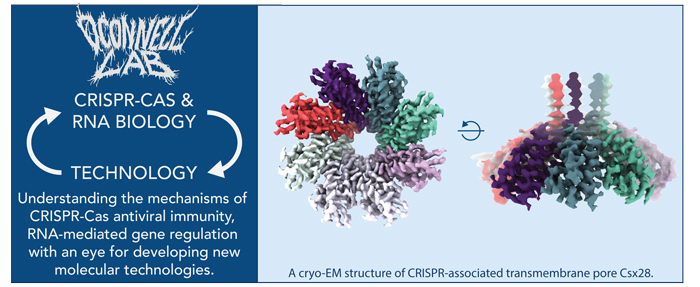
O'Connell Lab
Welcome to the O'Connell Lab

The O’Connell lab is focused on understanding the biochemical mechanisms of prokaryotic immunity and RNA-mediated gene regulation, and on the development of new tools to study these processes. We are particularly interested in two distinct areas of research:
- How RNA-targeting Cas13-containing CRISPR-Cas systems and their membrane-associated proteins function together to enhance anti-phage defense with an eye towards the discovery of new molecular tools and understanding the virus-host arms race, which has implications for vaccine development, phage therapy and antimicrobe drug resistance. We have discovered that in addition to containing RNA-guided nucleases, many CRISPR-Cas systems encode diverse accessory proteins that may help to bolster antiphage defense. Using a combination of cryo–electron microscopy, genetic, and biochemical approaches, our lab discovered that Csx28, an accessory protein found in some CRISPR-Cas systems, forms an inner membrane–localized octameric pore Upon Cas13 activation by viral messenger RNAs, Csx28 assists in protecting against sustained viral infection by helping to depolarize the inner membrane and slow metabolism. These findings expand the complexity of CRISPR-Cas–based defense systems and offer the potential for new molecular technologies (published in Science 2023). We are now expanding these efforts to look at other membrane-protein containing CRISPR-Cas systems, as well as other anti-phage defense systems
- How the tRNA modification N4-acetylcytidine (ac4C) is important for protein synthesis during human development, as we discovered loss of this modification results in a syndromic form of intellectual disability associated with developmental delay, behavioral abnormalities, hearing loss and facial dysmorphism. We are currently trying to further understand biochemically how loss of this chemical group on a subset of tRNAs results in the phenotype we see in patients, with the hope finding treatment strategies in the future.
We use a range of interdisciplinary approaches including molecular biology, protein and RNA biochemistry, CRISPR gene editing, CRISPR RNA-targeting strategies, structural biology, mass spectrometry, high-throughput sequencing, and bioinformatics to understand these processes.
Please see our publications for more details.

Mitchell R. O'Connell, Ph.D.
Principal Investigator
Mitch O'Connell: A serendipitous path to CRISPR
CRISPR regularly graces health and medicine headlines, with no sign of stopping. Within the sprawling field, University of Rochester professor and researcher Mitch O’Connell is creating a niche by zeroing in on CRISPR-Cas13. His goal? To better understand prokaryotic antiviral immunity and RNA-mediated gene regulation, and to inform the development of RNA detection tools that could improve clinical diagnostics.

Publications
- Transfer RNA acetylation regulates in vivo mammalian stress signaling.; Science advances; Vol 11(12), pp. eads2923. 2025 Mar 19.
- CUT&Tag Identifies Repetitive Genomic Loci that are Excluded from ChIP Assays.; bioRxiv : the preprint server for biology. 2025 Feb 05.
- Transfer RNA acetylation regulates in vivo mammalian stress signaling.; bioRxiv : the preprint server for biology. 2024 Jul 28.
- Aerosol Jet Printing-Enabled Dual-Function Electrochemical and Colorimetric Biosensor for SARS-CoV-2 Detection.; Analytical chemistry. 2023 Jul 28.
Affiliations
- Biochemistry & Biophysics
- Center for Biomedical Informatics
- Center for RNA Biology: From Genome to Therapeutics
- James P. Wilmot Cancer Center
- NIH T32 Training Grant in Cellular, Biochemical & Molecular Sciences
- Biochemistry & Molecular Biology Ph.D. Program
- Biomedical Genetics and Genomics Ph.D. Program
- Biophysics, Structural & Computational Biology Ph.D. Program
News
February 26, 2024
Mitch O’Connell: A Serendipitous Path to CRISPR
April 27, 2023
Pulling the Plug on Viral Infections: CRISPR isn’t Just About Cutting
August 26, 2021
GDSC Graduate Student Brandon Park Passes his Qualifying Exam!
February 2, 2021
UR Center for RNA Biology RNA Presentation Contest Results
Contact Us
O'Connell Lab
601 Elmwood Ave
Rochester, NY 14642